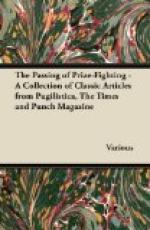A few of the figures feel secure, of course, but very few. Nelson on his column has no fears; Nurse Cavell is too recent to tremble; so is Abraham Lincoln. But the others? They are in a state of nervous suspense, wondering if the sentence of banishment is to fall and resenting any disturbance of their lives. “J’y suis, j’y reste” is their motto.
Abraham Lincoln gave me a hearty welcome and extended an invitation that is not within the power of any other graven image in the city. “Take a chair,” he said.
I did so and am thus, I suppose, the first Londoner to put that comfortable piece of furniture to its proper use.
“How do you like being here?” I asked.
He said that he enjoyed it. The only blot on his pleasure was the fear that the Abbey might fall on him, and he therefore hoped that The Times’ fund was progressing by leaps and bounds.
His immediate neighbours, on the contrary, exhibited no serenity whatever, and I found Canning and Palmerston shivering with apprehension in their frockcoats. The worst of it was that I could say nothing to reassure them.
Here and there, however, a desire for locomotion was expressed. Dr. Johnson, in the enclosure behind St. Clement Danes, is very restive. I asked him if he would object to removal. “Sir,” said the Little Lexicographer (as his sculptor has made him), “I should derive satisfaction from it. A man cannot be considered as enviable who spends all his time in the contemplation, from an unvacatable position, of a street to the perambulation of which he devoted many of his happiest hours.”
I ventured to agree.
“Nor,” continued the sage, “is it a source of contentment to a man of integrity to observe an unceasing procession of Americans on their way to partake of pudding in a hostelry that has made its name and prosperity out of a mythical association with himself and be unable to correct the error.”
“Are you in general in favour of statuary?” I made bold to ask.
“Painting,” said he, “consumes labour not disproportionate to its effect; but a fellow will hack half a year at a block of marble to make something in stone that hardly resembles a man. Look around you; look at me. The value of statuary is owing to its difficulty. You would not value the finest head cut upon a carrot.”
But one effect of this General Post among the statues is good, and it should delight Mr. Asquith. Cromwell, now outside Westminster Hall, is to be moved into the House.
E.V.L.
* * * * *
Flowers’ names.
Marigolds.
As Mary was a-walking
All on a summer day,
The flowers all stood curtseying
And bowing in her way;
The blushing poppies hung their heads
And whispered Mary’s
name,
And all the wood anemones
Hung down their heads in shame.




